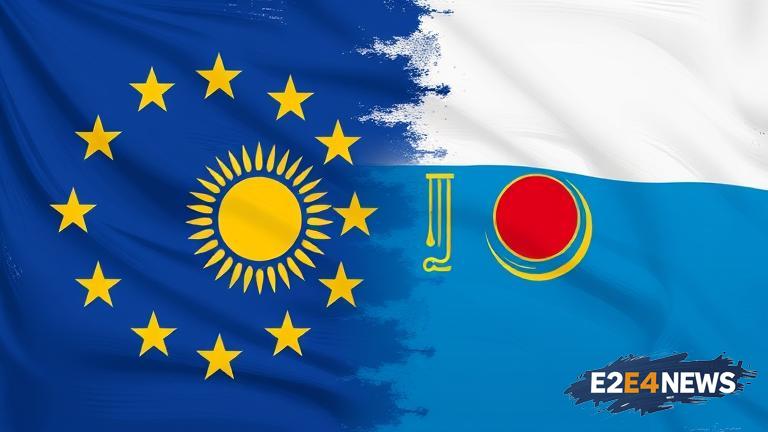The European Union (EU) and Kazakhstan have been fostering a strategic partnership over the years, with a focus on enhancing cooperation in areas such as trade, energy, and security. This partnership has become increasingly significant amidst the current geopolitical landscape, which is marked by shifts in global power dynamics and emerging challenges. The EU-Kazakhstan relationship is built on a foundation of mutual interests and benefits, with both parties seeking to expand their economic and political ties. Kazakhstan, being the largest economy in Central Asia, offers a strategic location and vast natural resources, making it an attractive partner for the EU. The EU, on the other hand, provides Kazakhstan with access to advanced technologies, markets, and investment opportunities. The two parties have been engaged in various cooperation frameworks, including the Enhanced Partnership and Cooperation Agreement (EPCA), which aims to deepen their economic and political integration. The EPCA has facilitated the increase of trade between the EU and Kazakhstan, with the EU being one of Kazakhstan’s largest trading partners. The energy sector is another area of significant cooperation, with Kazakhstan being a major oil and gas producer and the EU seeking to diversify its energy sources. The EU has also been supporting Kazakhstan’s efforts to develop its renewable energy sector, with a focus on reducing greenhouse gas emissions and promoting sustainable development. In addition to economic cooperation, the EU and Kazakhstan have also been strengthening their security ties, with a focus on combating terrorism, organized crime, and drug trafficking. The two parties have been engaged in various security-related initiatives, including the Central Asia Drug Action Programme and the Border Management Programme. The EU has also been providing Kazakhstan with technical assistance and capacity-building programs to enhance its security capabilities. Furthermore, the EU and Kazakhstan have been cooperating on regional issues, including the development of the Central Asia region and the promotion of regional stability. The EU has been supporting Kazakhstan’s efforts to promote regional cooperation and integration, including through the Central Asia Regional Economic Cooperation (CAREC) program. The EU-Kazakhstan partnership has also been marked by a strong focus on human rights and democratization, with the EU providing technical assistance and support to promote democratic reforms and human rights in Kazakhstan. Despite the many benefits of the EU-Kazakhstan partnership, there are also challenges that need to be addressed, including the need to enhance the business climate and promote investment in Kazakhstan. The EU has been encouraging Kazakhstan to implement reforms to improve the business environment and promote transparency and accountability. In conclusion, the EU-Kazakhstan relationship is a strategic partnership that has the potential to promote economic growth, stability, and security in the region. As the global geopolitical landscape continues to evolve, the EU and Kazakhstan must work together to address emerging challenges and promote their shared interests. The partnership has the potential to promote regional cooperation and integration, and to support the development of the Central Asia region. With its strategic location and vast natural resources, Kazakhstan is an important partner for the EU, and the EU-Kazakhstan relationship is likely to continue to grow and deepen in the coming years. The EU and Kazakhstan must continue to work together to promote their shared interests and to address the challenges that lie ahead. The future of the EU-Kazakhstan partnership looks promising, with many opportunities for cooperation and mutual benefit. The two parties must continue to engage in dialogue and cooperation to promote their shared interests and to support the development of the region. The EU-Kazakhstan partnership is a key component of the EU’s strategy for the Central Asia region, and it has the potential to promote stability, security, and economic growth in the region. The partnership is also important for promoting human rights and democratization in Kazakhstan, and for supporting the country’s efforts to develop its economy and promote sustainable development. Overall, the EU-Kazakhstan relationship is a strategic partnership that has the potential to promote mutual benefit and cooperation, and to support the development of the region.
